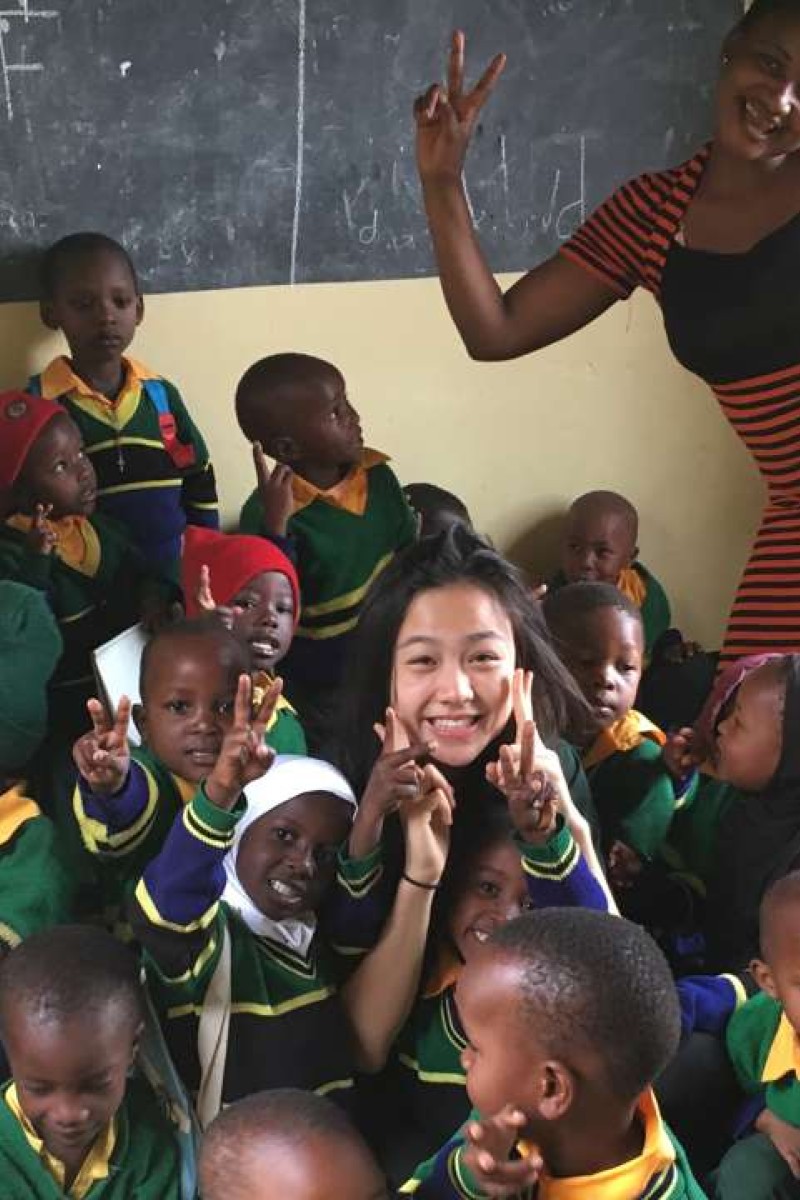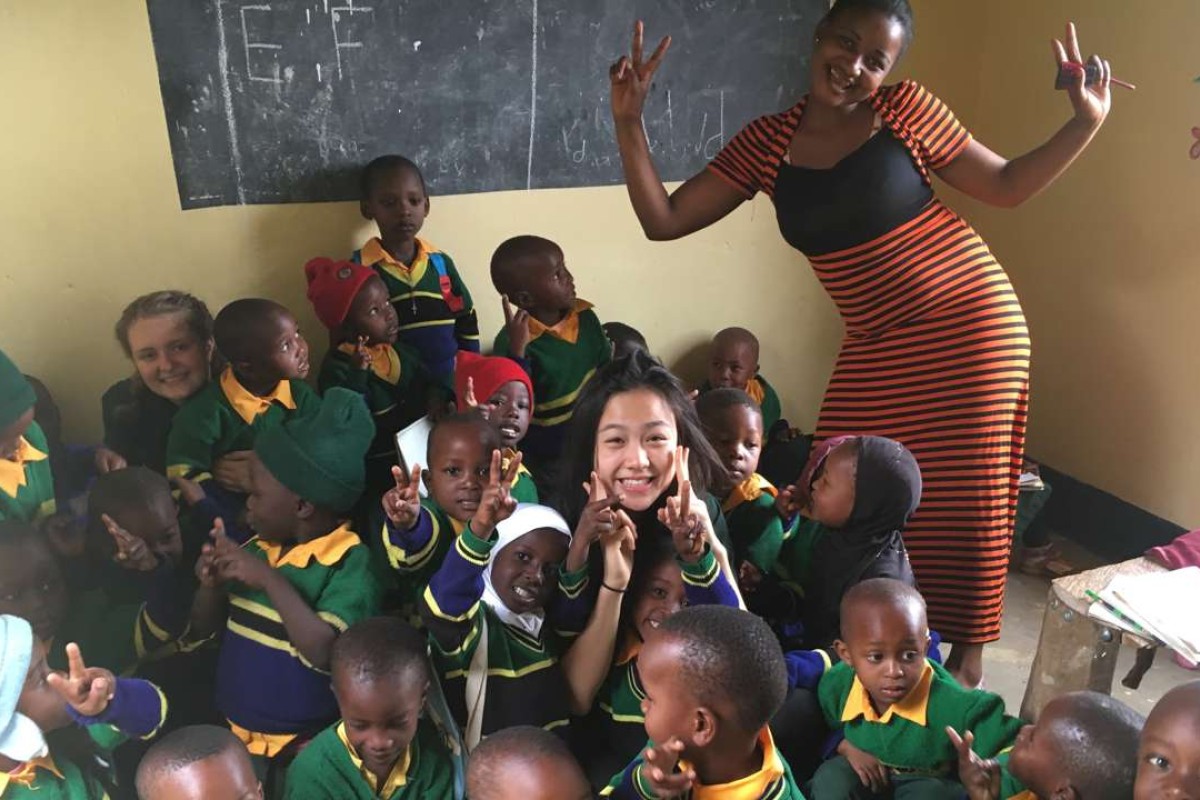
Volunteer in Africa: because big changes start with little steps
Help out at your parent’s work place? Lock yourself up at home to study, study, study? While away the perfect summer days with your friends? One Hong Kong student chose to do none of these things, and did voluntary work in East Africa
 The children showed a lot of enthusiasm in class.
The children showed a lot of enthusiasm in class.Many secondary school students from Hong Kong get jobs to earn money or do a lot of studying during the summer. As for me, I joined the Care and Community Project in Tanzania, East Africa which was organised by Projects Abroad. I was there for two weeks.
Every single day we, the volunteers, would head out from where we were staying to the Relini Centre. The centre is both a school and an orphanage, and we were there to teach the children simple English and mathematics, as well as helping out with its construction and renovation. The classrooms were small – no bigger than 200 sq ft – and the students would sit there quietly waiting for their teachers to arrive.
Even though to them we were just brief visitors, they welcomed us warmly. There were no stationary or books for them to write in, so we had to show them everything on a blackboard at the front of the classroom. Despite the limited resources the students showed more enthusiasm and willingness to learn new things than students ever do in Hong Kong.
One of the students, called Afia, was trying to learn how to write numbers from one to 10, but she would get stuck at six, turning it upside down when she tried to write it out. My Swahili wasn’t very good – I only knew basic phrases that I’d picked up from a book – so I kept telling her: “Soma sita”. I thought I was telling Afia to write down the number six, but it turns out I was telling her to read out loud the number six, which is why she would keep saying “Sita” back to me instead of copying down what I wrote.
In the end I held her hand and showed her how to write the number, and after many attempts she was able to do it on her own. I can’t even begin to explain how proud I was of Afia and how happy I was for her that she now knew how to write the number six. It felt as if I had made a difference in her life.
The students would spill out onto a huge, sprawling grass field during breaks between lessons. Their playground had no boundaries and their only limits were their imaginations. The school curriculum in Africa is not like the tightly scheduled one we’re used to in Hong Kong – the students were only required to know how to sing, count to 10 and some basic mathematics.
I lived with a local host family, as did seven other volunteers. There was a room for boys, a room for girls, and a living room in which we could all relax in. The other volunteers had arrived from all over the world and we all got on very well – we had plenty of time to get to know each other, as there wasn’t any internet to distract us.
For example, my follow volunteers were shocked when they realised I would eat dried squid as a snack, but they ended up liking it when they tried it. Despite all our differences, we all had one goal – to help the local children in any way we could. We renovated a dining hall together – a difficult task as we had to transport mud, assemble bricks and paint under the burning sun. But we didn’t slack off, as we knew our work would leave behind a good environment for the children in which to learn. This, along with the breaks when we could play with the children and draw on the walls, gave us all the motivation that we needed.
Hakuna matata is a Swahili phrase that means “no worries”. It’s a phrase that is often said in Africa, and lots of people know it from the Disney film The Lion King. But just because it’s a common phrase doesn’t mean it’s not true – it really is and it really reflects the relaxed lifestyle of the people there. It might seem a boring place at first, but it’s easy to fall in love with the simplicity and the way people take things easy. In some ways, it made us think about what’s really important in life and how unnecessarily taxing our busy schedules in Hong Kong can be.
Before heading off to Africa, I was pretty worried about my personal safety and mosquito-borne diseases like yellow fever. However, after I realised that the chances of being infected were low as long as I took proper mosquito precautions such as being vaccinated and wore long-sleeved clothes, I wasn’t as concerned anymore. I would recommend volunteering in Africa to everybody.
The people in Africa were warm and friendly towards me. If you decide to volunteer in developing countries like Africa, it’s probably best to learn the basics of their main language, as the locals might not speak English. It took me all of one plane ride to learn at least the basics of Swahili from a book, and that really helped me when I was there. In Swahili, kushiriki means “share”, and I feel like my trip to Tanzania was an enriching and inspiring experience to kushiriki with others.
My trip has made me so much more aware of the world’s wealth disparity. I know that, in the greater scheme of things, my two weeks in Africa hasn’t made a big difference, but I hope that I have helped in some small way anyway. Even the tiniest of ripples can disturb a lake, and I hope with this article I can move students just like me to do something. Big changes start with little steps – the first one is being aware of the problem and acknowledging that you can make a difference. You can help to eradicate the problems that people suffer - everyone can.
